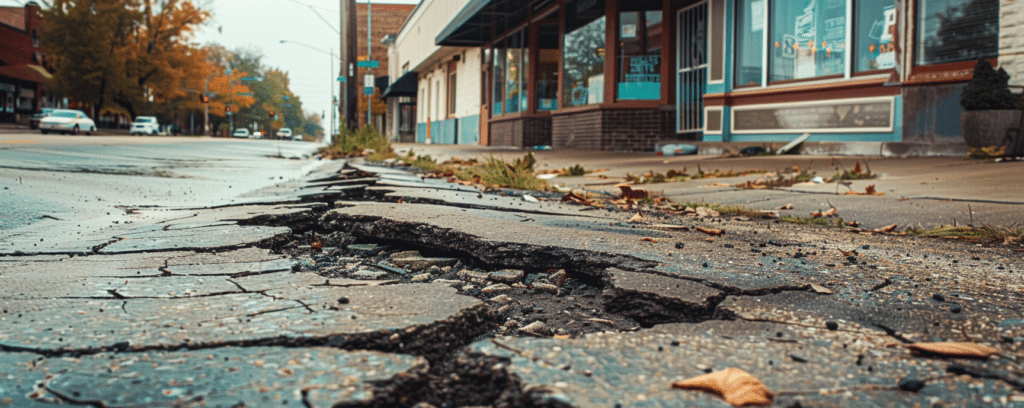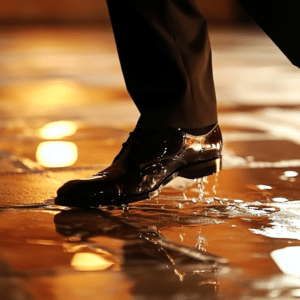
Slip and fall law in Illinois covers the legal responsibilities of property owners to keep their premises safe and what happens if they don’t. Fall accident victims can seek compensation for injuries sustained on someone else’s property, and understanding the legal claims process is crucial. If you slip and fall on someone else’s property, you may wonder who is at fault and what your legal rights are under slip and fall law, Illinois. This guide explains the key aspects of Illinois slip and fall law, including how to establish liability, what types of compensation you might be entitled to, and what steps to take if you are injured.
Key Takeaways
- The Illinois Premises Liability Act requires property owners to maintain safe conditions and address hazards promptly to avoid liability for slip and fall injuries.
- Liability in slip and fall cases is determined by proving negligence, which includes establishing the property owner’s duty of care, breach of that duty, and a direct link to the injuries sustained.
- Illinois follows a modified comparative negligence rule, whereby a plaintiff’s compensation can be reduced based on their level of fault in the slip and fall incident.
- It is crucial to file personal injury claims within two years of the accident date to secure the right to monetary recovery, as failing to do so can result in a waiver of that right.
Your search for help ends here. Let’s get started, for FREE.
Understanding the Slip and Fall Law Illinois: Your Essential Guide
The Illinois Premises Liability Act is designed to protect individuals from unsafe conditions on properties they visit. This act mandates that property owners maintain their premises in a safe condition to prevent accidents. Property owners must regularly inspect their premises, address potential hazards promptly, and provide adequate warnings if immediate repairs cannot be made.
When property owners fail to fulfill these duties, they may be held liable for accidents resulting from their negligence. This liability extends to a variety of fall accidents, whether they occur in a grocery store, on a sidewalk, or within a private property. Property owner’s negligence is pivotal in determining liability in slip and fall cases, and victims can seek compensation if the property owner’s failure to maintain safe conditions leads to their injuries.
In Illinois, property owners owe different levels of care based on the visitor’s status, with invitees receiving the highest duty. Generally, owners are not liable for injuries from obvious dangers or natural snow and ice accumulations unless other property issues are involved. Knowing these nuances is crucial for anyone dealing with a slip-and-fall incident.
Introduction
Slip and fall law in Illinois governs how liability is assigned when individuals are injured on someone else’s property. Establishing liability in these cases involves addressing complex legal issues, including the classification of the injured party and the property itself. Victims must prove that a hazardous condition existed and that the property owner failed to address it, in accordance with fall laws.
Key factors like the standard of care and notice of hazardous conditions determine liability in slip and fall claims. For those injured in such incidents in Illinois, being aware of your rights and potential compensation is vital.
Overview of Illinois Premises Liability Act
Premises liability holds property owners accountable for accidents due to unsafe conditions on their properties. The Illinois Premises Liability Act mandates that property owners keep their premises safe for visitors, which includes regular inspections and prompt hazard management.
Negligence is key in determining liability. Property owners may be liable for slip and fall injuries if they fail to address known hazardous conditions. Injured individuals can seek compensation from the establishment responsible for maintaining the unsafe property.
For a successful premises liability claim, the injured party must demonstrate that the property owner’s negligence directly caused their injury. This involves proving that the property owner breached their duty of care and that this breach resulted in the slip and fall incident.
Key Elements of a Slip and Fall Case
In a slip-and-fall case, property owners are legally required to keep their premises safe for visitors, a duty known as the duty of care. A breach of this duty occurs when a property owner fails to address a known dangerous condition on their property. This breach must be directly linked to the slip and fall incident, known as causation.
Damages refer to the actual losses incurred by the victim, such as medical expenses and lost wages. To succeed in a slip and fall claim, all four elements of negligence—duty, breach, causation, and damages—must be proven. Without establishing these elements, it is challenging to hold the property owner accountable.
A thorough investigation and documentation are crucial in proving these elements. Gathering evidence such as photographs, witness statements, and medical records can significantly strengthen a slip-and-fall case.
Visitor Classification and Its Impact on Liability
In Illinois, property visitors are classified into three categories: invitees, licensees, and trespassers. Invitees enter the property for business purposes, whereas licensees visit for social reasons, and trespassers enter without permission. Property owners owe invitees the highest standard of care and must ensure their safety.
Licensees must be warned of known hazards, while trespassers generally receive no duty of care unless they are children. Understanding visitor classification is crucial as it influences liability and the burden of proof in slip and fall claims.
Property owners must take reasonable steps to ensure visitor safety to avoid liability for any injuries sustained.
Injured in a Slip-and-Fall accident?
Common Causes of Slip and Fall Accidents
Slip and fall accidents can be caused by a variety of hazardous conditions. Wet surfaces, particularly in stores without warnings, are frequent triggers for these incidents. Uneven walkways, such as cracked sidewalks or potholes, can also lead to slip-and-fall accidents.
Obstructions such as loose wires, cluttered walkways, and inadequate lighting are common factors contributing to falls. Damaged handrails and unstable steps are significant safety hazards. These conditions often result from property owners’ negligence in maintaining safe premises.
Proving Negligence in Slip and Fall Cases

The injured party must show that the accident was a direct and foreseeable result of the property owner’s negligence. Property owners are expected to maintain a standard of care that varies based on the type of property and its purpose. The doctrine of reasonable care requires property owners to keep premises safe and address hazards promptly. Evidence preservation is crucial for strengthening a slip-and-fall claim.
Documenting hazardous conditions, collecting witness statements, and securing expert testimony can strengthen a case.
Key components for proving negligence include showing reasonable care and gathering strong evidence.
Statute of Limitations for Slip and Fall Lawsuits in Illinois
Illinois law mandates specific timelines and rules that govern slip and fall injury claims. The legal timeframe to file a slip and fall lawsuit in Illinois is two years from the date of the injury. Failure to file a claim within this period means the victim forfeits their right to seek compensation.
Certain exceptions, like the Discovery Rule, can extend the statute of limitations if the injured party was unaware of their injuries. For minors, the statute of limitations is paused until they reach adulthood, allowing claims to be filed within two years after turning 18.
Special rules apply when pursuing claims against government entities, often requiring shorter notice periods.
Comparative Negligence in Illinois Slip and Fall Claims
Illinois follows a modified comparative negligence rule, meaning a claimant’s compensation can be reduced based on their own fault in the accident. Under this rule, damages are reduced proportionally to the percentage of the plaintiff’s responsibility. If a plaintiff is found more than 50 percent responsible for the slip and fall accident, they are not eligible for compensation.
Defendants may attempt to demonstrate a higher percentage of fault to reduce or deny compensation to the plaintiff. Anyone filing a slip and fall claim in Illinois should understand the modified comparative negligence rule.
Typical Injuries from Slip and Fall Accidents
Slip and fall incidents can lead to serious injuries and financial burdens, often prompting victims to pursue claims for compensation against property owners based on premises liability. Fractures are common, particularly among older adults or those with bone density issues. Traumatic brain injuries can occur even without direct head contact, leading to serious complications if untreated.
Sprains in wrists or ankles often occur from improper landings during a fall. Knee injuries, such as ligament tears, can result from twisting motions. Immediate medical care is vital to address these injuries and prevent complications. Chronic pain and soft tissue damage may also develop, affecting the victim’s quality of life and mobility.
Cuts and bruises, while seemingly minor, can lead to significant emotional distress and require medical attention. Spinal injuries from falls can result in severe pain and even paralysis in extreme cases. Understanding the potential severity of slip and fall injuries underscores the importance of seeking proper medical care and legal representation to address these issues, as individuals may suffer severe injuries.
Potential Damages Recoverable in Slip and Fall Cases
Victims of slip and fall accidents may recover damages such as medical bills, lost income, and compensation for pain and suffering. The total award often depends on injury severity and the extent of medical treatment. Detailed notes about injuries and their impact can help establish the case’s value.
Debilitating injuries from a slip and fall can lead to significant medical bills and lost earnings. Engaging a slip-and-fall attorney can significantly enhance the likelihood of recovering financial compensation for injuries. Legal representation can lead to higher settlement amounts than victims might achieve on their own.
Steps to Take After a Slip and Fall Incident

Taking photographs from various angles to capture the hazardous conditions that caused the slip and fall is essential. Reporting the incident to the property owner or manager is crucial to document the occurrence and ensure awareness of the hazard. Please give a straightforward summary of the accident. Include details about the injuries that were reported.
Engaging witnesses can provide objective accounts to corroborate your claims after a slip-and-fall incident. Consulting with a personal injury attorney shortly after the incident is crucial to investigate your case and determine eligibility for a lawsuit.
Immediate actions following a slip and fall can significantly impact the outcome of your claim.
The Role of a Slip and Fall Lawyer
Hiring an experienced slip-and-fall lawyer is essential for navigating the complex legal processes involved. A lawyer can help victims understand their rights, gather evidence, and build a strong case to hold property owners accountable. Legal representation often results in higher settlements and ensures that victims’ rights are protected throughout the process.
Lawyers, such as those at Shuman Legal, work on a contingency fee basis, meaning victims can pursue claims without upfront costs. This arrangement allows victims to focus on recovery while their attorney handles the legal complexities.
A skilled slip and fall attorney can significantly enhance the likelihood of recovering fair compensation for injuries sustained in the fall accident lawyer.
Frequently Asked Questions
What should I do immediately after a slip and fall accident?
Immediately seek medical treatment to address any injuries and establish a medical record. Document the hazardous condition with photographs, report the incident to the property owner, and consult a personal injury attorney.
How long do I have to file a slip-and-fall lawsuit in Illinois?
In Illinois, you have two years from the date of your slip and fall injury to file a lawsuit. Be mindful of any exceptions that may impact this timeframe.
What types of damages can I recover from a slip and fall case?
In a slip and fall case, you can recover damages such as medical bills, lost wages, and compensation for pain and suffering. The total award will be determined by the severity of your injuries and the medical treatment required.
How is liability determined in a slip-and-fall case?
Liability in a slip and fall case is established by demonstrating that the property owner was negligent in maintaining a safe environment, which directly resulted in the accident. This requires evidence of the owner’s duty to ensure safety, a breach of that duty, causation linking the breach to the incident, and any resulting damages.
Do I need a lawyer for a slip-and-fall claim?
It is advisable to hire a lawyer for a slip-and-fall claim, as they can effectively manage the legal complexities and enhance your chances of receiving fair compensation. Furthermore, many lawyers work on a contingency fee basis, which allows you to pursue your claim without any upfront costs.











